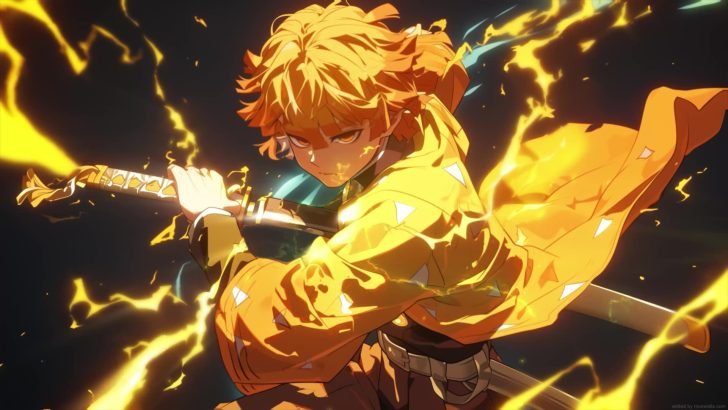In the world of Kimetsu no Yaiba (Demon Slayer), filled with terrifying demons, intricate swordsmanship, and profound emotional journeys, Zenitsu Agatsuma stands out as one of the most memorable and beloved characters. Though initially introduced as a somewhat cowardly and comedic figure, Zenitsu’s journey throughout the series reveals surprising depths of courage, strength, and complexity. As a member of the Demon Slayer Corps, Zenitsu plays a crucial role in the fight against the demonic forces that threaten humanity.
This article takes an in-depth look at Zenitsu, exploring his character development, unique fighting style, relationships with other characters, and the broader significance of his role in Demon Slayer: Kimetsu no Yaiba. Zenitsu’s story is one of growth, self-discovery, and the power of perseverance—traits that resonate deeply with audiences and make him a character worth analyzing in detail.
Zenitsu’s Background and Personality
Zenitsu Agatsuma is introduced in Kimetsu no Yaiba as a timid, anxious, and cowardly young man who fears almost everything—especially the idea of fighting demons. He often claims that he doesn’t want to be a demon slayer and spends much of his time trying to avoid confrontations, believing that he will die at any moment. His extreme fear of danger and tendency to overreact provide a lot of the comic relief in the series, but underneath his nervous exterior lies a character with much more to offer.
A Fearful Hero
Zenitsu’s fear is not without reason. He comes from a tragic background where he was swindled into debt by a woman he loved, leading to him being taken in by a former Hashira, Jigoro Kuwajima, to train as a Demon Slayer. However, Zenitsu’s insecurities often hold him back from fully embracing his potential. He constantly underestimates his abilities, lacks self-confidence, and frequently considers himself a burden to his comrades.
Despite his fear, Zenitsu has an undeniable sense of responsibility and a deep desire to protect those he cares about, even if he doesn’t believe he is capable of doing so. His fear of demons and death contrasts sharply with his determination to honor his mentor and protect the innocent, making him one of the most emotionally complex characters in the series. This internal conflict is what makes Zenitsu’s character arc so compelling as the story progresses.
The Hidden Strength
Zenitsu’s seemingly contradictory nature is most evident in his moments of unconscious bravery. Due to his intense fear, Zenitsu has developed a unique ability: he can only unleash his full potential when he is asleep or in a state of extreme panic. While conscious, Zenitsu is often too overwhelmed by his fear to act effectively, but when he passes out from terror, his body moves on instinct, revealing a remarkable and lethal side to his personality. This phenomenon becomes central to Zenitsu’s fighting style, particularly when he uses his signature technique, Thunder Breathing.
Thunder Breathing: Zenitsu’s Fighting Style
One of the most unique and visually striking aspects of Zenitsu’s character is his use of Thunder Breathing, a powerful sword-fighting technique based on lightning-fast movements and precision. Though Zenitsu has only mastered the first form of Thunder Breathing, his skill with this technique is nothing short of extraordinary.
First Form: Thunderclap and Flash
Zenitsu’s primary technique is the First Form: Thunderclap and Flash. This technique allows Zenitsu to move with blinding speed, attacking his enemy before they even have time to react. When performed correctly, Thunderclap and Flash is so fast that Zenitsu can decapitate demons in an instant, making it one of the most effective offensive moves in the series.
While many other Demon Slayers master multiple forms of their respective breathing styles, Zenitsu has focused all his efforts on perfecting this single technique. This focus on mastery, rather than diversification, allows Zenitsu to perform Thunderclap and Flash at an exceptionally high level. He eventually develops more powerful versions of the move, such as the Six-Fold, Eight-Fold, and Godspeed variations, increasing the speed and number of strikes he can unleash in rapid succession.
Despite only using the first form of Thunder Breathing, Zenitsu’s skill level demonstrates that true mastery of one form can be just as powerful as versatility. His growth in the use of Thunder Breathing parallels his emotional development, as he learns to harness his fear and channel it into something constructive.
Symbolism of Thunder Breathing
The symbolism of Zenitsu’s Thunder Breathing technique is also worth noting. Lightning is often associated with sudden power, unpredictability, and overwhelming force—much like Zenitsu himself. His strength comes in bursts, often surprising his enemies and even his comrades. Thunder Breathing represents Zenitsu’s potential: even though he may seem weak or unreliable on the surface, he has an undeniable inner power waiting to be unleashed.
Character Development: From Cowardice to Courage
Zenitsu’s character arc is one of the most notable in Demon Slayer, as he undergoes significant growth throughout the series. His journey from a cowardly, frightened boy to a brave and reliable Demon Slayer is one of the most satisfying transformations in the story. Unlike some of the other characters, such as Tanjiro or Inosuke, who are confident in their abilities from the start, Zenitsu’s growth is much more gradual and hard-earned.
Early Struggles
At the beginning of the series, Zenitsu’s overwhelming fear of demons and constant belief that he is going to die make him seem almost out of place in the Demon Slayer Corps. He frequently begs others to protect him and tries to flee from battle, which can be frustrating for viewers who expect their heroes to be fearless and brave. However, Zenitsu’s fear is what makes him relatable. He represents the human side of the fight against demons—the part that feels fear, doubt, and insecurity in the face of overwhelming odds.
Despite his fear, Zenitsu never abandons his duty. Even when terrified, he finds ways to continue fighting, often falling unconscious and letting his training take over. His fear, instead of being a weakness, becomes a driving force that pushes him to survive and protect those around him.
Growth Through Relationships
Zenitsu’s relationships with his fellow Demon Slayers, particularly Tanjiro Kamado and Nezuko Kamado, play a crucial role in his development. Zenitsu admires Tanjiro’s kindness, bravery, and unwavering sense of duty, and he often looks up to him as a role model. Although Zenitsu often feels inferior to Tanjiro, their friendship helps Zenitsu develop a stronger sense of self-worth.
Zenitsu’s affection for Nezuko, Tanjiro’s demon sister, is another important aspect of his character. While initially comedic, as Zenitsu is often seen fawning over Nezuko, his love for her eventually becomes a source of motivation. His desire to protect Nezuko, despite her being a demon, reflects his growth as a person. He sees beyond her demonic appearance and values her for her kindness and innocence, which mirrors his own journey of seeing past his fears to recognize his inner strength.
Facing Fear and Becoming a Hero
Zenitsu’s pivotal moment comes during the Mugen Train Arc, where he confronts his deepest fears in the face of a powerful demon. In this arc, Zenitsu must protect Nezuko and the passengers on the train from the demon Enmu, despite his terror. This moment is a turning point for Zenitsu, as he steps up to the challenge without hesitation, showing a newfound bravery and determination.
From this point onward, Zenitsu becomes more proactive in battle, relying less on his unconscious fighting state and more on his conscious resolve to protect those he loves. By the time the story reaches its final arcs, Zenitsu is no longer the cowardly boy who fears everything around him. He has become a true Demon Slayer, capable of facing his fears head-on and fighting with purpose and courage.
Zenitsu’s Role in Demon Slayer’s Themes
Zenitsu’s character serves as a vital component in Demon Slayer’s exploration of fear, courage, and perseverance. His journey embodies the idea that true bravery isn’t the absence of fear, but the ability to act in spite of it. Zenitsu constantly faces his fears, and while he may not always do so gracefully, he never gives up.
Fear as a Motivator
Throughout Demon Slayer, fear is a central theme. Characters like Zenitsu, Tanjiro, and Inosuke all experience fear in different ways, but it is how they respond to that fear that defines them. Zenitsu’s unique relationship with fear—using it as both a limitation and a source of strength—provides an important lesson for viewers. His story demonstrates that fear doesn’t have to be paralyzing. In fact, it can be the very thing that pushes someone to reach their fullest potential.
The Power of Self-Belief
Another key theme in Zenitsu’s story is the importance of self-belief. For much of the series, Zenitsu struggles with feelings of inadequacy and self-doubt. He constantly compares himself to others, particularly Tanjiro and Inosuke, and feels that he falls short. However, as he grows and hones his skills, Zenitsu learns that believing in oneself is essential to unlocking one’s true potential. His journey is a reminder that everyone has their own path to greatness, and that strength often comes from within.
Conclusion: Zenitsu’s Legacy in Demon Slayer
Zenitsu Agatsuma is one of the most dynamic and relatable characters in Demon Slayer: Kimetsu no Yaiba. His blend of comedic elements, emotional depth, and surprising combat prowess makes him a fan-favorite. From his timid and fearful beginnings to his eventual emergence as a confident and courageous warrior, Zenitsu’s character arc is one of growth and empowerment.
Through his struggles with fear and self-doubt, Zenitsu offers a message of perseverance and resilience. His use of Thunder Breathing is a testament to his potential, proving that even in the face of overwhelming odds, anyone can rise to the occasion and become a hero. Zenitsu’s journey resonates with audiences because it reflects the human experience—facing fear, finding strength, and ultimately believing in oneself.
You may also read: squid ward




